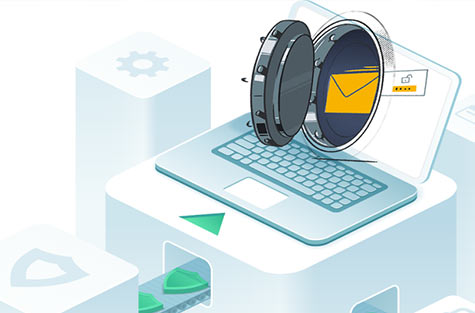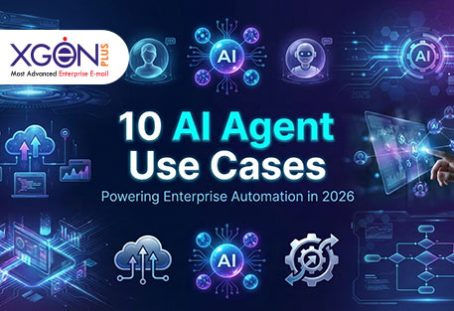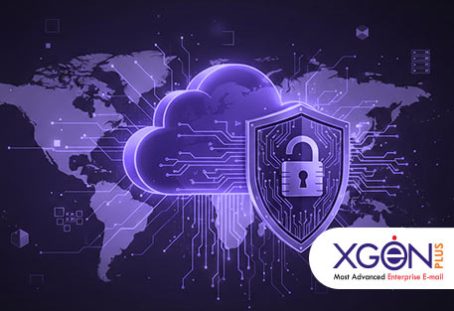
Email Hosting: The Ultimate Guide to Choosing the Best Provider for Your Business Needs
December 27, 2023
Connect Instantly, Securely: Video Meetings Built into Your Email Inbox
December 27, 2023
Introduction: The Importance of Secure Email Communication

In this digital age, email is our lifeline of communications. From idle chat to trusty contacts, it bears the beat of our lives. This convenience can hide a vulnerability: the ease with which data circulates also makes it easier to nosy around. That's where secure e-mail communication kicks in, providing a digital safe for your letters.
So think of it as a fortified network conduit for your data. With email encryption, your words are scrambled into an indecipherable code. Only the recipient whose key unlocks their meaning can open them up again. In addition, it protects sensitive information, such as financial data or personal records. This measure also reinforces network security by reducing the threat of weaknesses at email gateways.
Thus, whether you are a freelancer sending client invoices or a business sharing internal documents, secure email is an absolute must. It's the padlock on your digital threshold, an impervious umbrella against unwelcome intrusion.

Understanding the Risks of Unsecured Email Communication
All sorts of things may lie in our inboxes: casual chats with friends, stuff to do at work, or just birthday greetings—under the surface, it is a minefield. In an unsecured email environment.
Your messages are out in the open—subject to a whole litany of threats ranging from hacking attacks like usurping your account and stealing sensitive information to being sold off as part of someone's marketing database. This can result in data leaks, with your personal information and passwords landing in the darkest depths of every corner of the web.
And finally, there are phishing attacks--sleekly designed e-mails that appear to be from legitimate sources but which are trying to coax you into revealing sensitive information such as login credentials or credit card numbers. And then there are man-in-the-middle attacks. If you send emails to someone, cybercriminals may intercept and read them all right in your face.
They can eavesdrop on what otherwise would be completely private conversations between yourself and another person; they even have a chance at tampering with the content of those exchanges themselves!
Fundamentally speaking, to depend on unsecured email is just like sending postcards in a blizzard. The message will probably arrive at its intended destination but the chances of it being intercepted or changed are ridiculously high.
Safeguard your digital life: Don't let email turn into a criminal's playground by taking measures for secure communication.
The Role of Encryption in Securing Email Communication

Think of a secret message carried in a locked box, except that when it's traveling across the internet only one will hold its key. This is the whole point of email encryption. Most basically, it's like wrapping your email in a digital cloak. The contents are scrambled into an unreadable code until the right key unlocks them.
There are two main types:
Transport Layer Security (TLS), also known as SSL, which keeps email safe while it shuttles between computers; and end-to-end encryption for added security. TLS can be thought of as a secure tunnel through which your email travels, while end-to-end encryption represents the locked box at either end requiring only opening by the recipient's private key.
A complex system known as Public Key Infrastructure (PKI) produces this key. It identifies the recipient like a digital passport and gives them access to unlock that secret hidden treasure in the message.
So, why is email encryption necessary?
It's the difference between sending your credit card number in ordinary text and whispering it in a soundproof room. Information such as financial data, medical records, and business secrets needs to be protected both against prying eyes during transit and when at rest on servers.
With cyber threats from around every corner, email encryption is no longer just a necessary business tool but an essential part of everyone's online life security and privacy.

Best Practices for Secure Email Communication
The first line of defense:
Is robust email security protocols. Choose providers that provide encryption, spam fighting, and virus scanning. It's like Fort Knox, only for your emails.
After that, strengthen the password with strong ones and two-factor authentication (2FA). Scrap dictionary words and spoil for complexity Put upper- or lowercase letters, numbers, and symbols to work. You've probably heard about 2FA. Think of it as a moat: an extra layer of protection in the case that your first line is compromised, you can use codes sent to your phone or trusty security apps instead.
Lastly, don't forget it; even the sturdiest castle also requires maintenance. Install the latest software updates and patches to plug any holes before attackers can exploit them. This might be better envisioned under the metaphor of fixing cracks in a stone wall so that your email fortress does not easily fall.
If you apply these best practices, then your inbox will be turned from a miserable shack into an impregnable digital vault. So, talk freely. Your words will be secure from men's eyes and evil intentions. In the digital age, keeping your email secure is not merely a matter of good manners. It's what you wear into battle as an effective spokesperson for our great society!
Choosing the Right Email Service Provider for Enhanced Security

As for email, the beating heart of many workflows: picking the right provider turns out to be a life-or-death decision in achieving maximum security. Opening the door to email service providers with encrypted features and secure mail gateways (SEGs).SEGs are like digital castles, defending your inbox from the eyes of strangers and hidden menaces.
The guardians of the inbox:
Before leaving port, make sure your existing email is still intact. Many providers provide backup services but double-check to see what your current host offers. With a digital life raft, at least your messages are safe even if the migration gets caught in a squall.
Rule #2: Patience Wins the Race:
These ESPs(Email Service Providers) such as Xgenplus and Zoho Mail provide a powerful set of security features to protect your data. Seek out providers with encryption built-in (not only for rest but also in transit). This means that your emails are all scrambled while in transit and storage, so even if one is intercepted it cannot be read. Moreover, SEGs are sentinel gatekeepers who watch over your inbox too carefully. They scan incoming emails for malware and phishing attempts before they arrive to infect your desktop or device.
Xgenplus, for example, claims their "Zero-Knowledge Proof" technology guarantees end-to-end encryption with a verifiable key to your digital vault that only you hold.
Zoho Mail:
It raises the stakes in business email with spam filtering that's powered by intelligence and advanced threat detection, yielding an immaculate-tasting broth.
But the finest ESPs don't simply focus on security, and will typically provide multi-factor authentication along with data loss prevention (like Google takes to protect your Gmail emails). And if you especially need to comply with industry regulations like HIPAA or GDPR? No worries--there are plenty of good providers that specialize in such services.
Which providers you should choose depends on what kind of needs you have. If a high degree of security is required for personal use, you may choose one that operates with robust encryption and zero-knowledge policies.
At an abstract level, SEGs provide enterprises with additional functions such as data loss prevention and compliance requirements including GDP. Weigh your priorities, and research providers meticulously, and remember: For email security, a proactive approach is worth its weight in digital gold.
Extra Layer of Protection with PGP Encryption: Your Digital Armor in a Risky World
For an impenetrable shield against prying eyes, consider layering PGP encryption onto your email security arsenal. PGP, standing for Pretty Good Privacy, acts as a digital fortress, scrambling your messages into an unbreakable code accessible only to authorized recipients with the corresponding key.
The beauty of PGP encryption lies in its decentralized nature. Unlike traditional key-based systems controlled by a single entity, PGP empowers both sender and recipient to hold the keys to communication. This eliminates the risk of a central point of failure and ensures ultimate control over your data.
Xgenplus, recognizing the paramount importance of data security, proudly offers integrated PGP encryption, allowing you to seamlessly build this extra layer of protection into your email strategy.
With Xgenplus, you can enjoy peace of mind knowing your sensitive information travels in an armored vault, impervious to digital threats.

Educating Employees on Secure Email Practices and Awareness Training
Email is still the workhorse of communications in today's digital world. But with convenience comes vulnerability. Responding quickly here can help protect our resources.
Meanwhile, e-mail security training programs provide a productive solution: by using them you turn your employees from possible victims into steely guardians of company assets. These programs train your teams and provide them with the knowledge necessary to correctly identify phishing attempts as well as messages that appear on their face to be, e.g., invoices or other forms of offer- all in an attempt by attackers at passwords. Imagine that we are building a wall, awareness brick by digital brick.
Employees trained through interactive modules, simulations, and examples from real life to identify red flags activities like misspelled sender names, unusual attachments, or grammatical errors. They learn to find urgency tactics and pressuring language: after all, real emails are rarely accompanied by tricks. This training gives them the ability to think before clicking, saving users from becoming victims of such cleverly designed scams.
Email Security Awareness Training doesn't just protect data. It can also help you to safeguard your brand, finances, and the people inside your organization. Through cultivating a culture of cybersecurity awareness, you can give your employees awareness to defend against future hacks--strengthening what's proven to be an already impregnable digital fortress. A well-trained workforce is a stronger one, however, and don't forget that the Internet threat landscape never rests.
The Future of Secure Email Communication: Emerging Technologies to Watch Out For

As threats increase, so too must there be tougher challenges for our defenses. Fortunately, the secure email communication of tomorrow is bursting with new ideas that are changing forever what it means to send and read a message confidently.
One game-changing development is the appearance of Advanced Email Authentication Methods such as Domain-based Message Authentication Reporting and Conformance (DMARC). This clever protocol plays the role of a digital doorman, checking the identification card of senders before emails end up making an appearance in your inbox. With the help of DMARC, we can severely impair such phishing scams and spoofing operations leaving cyber-giants with nothing but bounced emails combined with crushed hopes.
Nonetheless, the future of email security is not completely dependent on authentication protocols. In a nutshell, machine learning-based threat detection implements artificial intelligence to sniff out malicious content hiding among emails. This technology is changing rapidly and advancing by leaps and bounds; little wonder then that it's become one of the hottest topics in security today.
These intelligent systems analyze email patterns, attachments and even writing styles to detect suspicious activity with remarkable accuracy. Think of it as having a 'Sherlock Holmes' in your email who scans every official message looking for traces or even only inkling aspects of digital log wrongdoings.
With the convergence of these emerging technologies, a bright future is opening up for email communications. Thanks to standards Advanced Authentication service (AAS) and our threat detection system supported by sophisticated Artificial Intelligence, we have finally built a stronghold of security for inboxes. Therefore, the next time you click send secure in the knowledge that your message is safe in its traveling bag.
Conclusion: Safeguard Your Data with Secure Email Communication Across Networks
Let's Recap! Unsecured emails are vulnerable, posing risks like interception, man-in-the-middle attacks, and data breaches. Encryption is key, but best practices like strong passwords, vigilance against phishing, and choosing a secure ESP like XGenPlus with advanced features, multi-factor authentication, and DLP are critical.
XGENPLUS stands ready to be your partner in securing your valuable data across networks.
Take control today - contact us for a consultation, download our white paper, or try our secure platform for free.
Let's build a future where email communication is both convenient and trustworthy.




